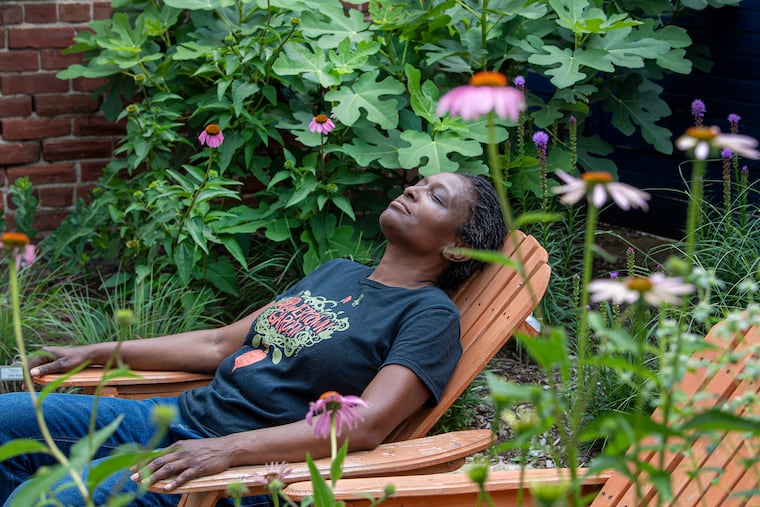Community gardening boomed during the pandemic. Can Philadelphia keep up?
Gardening was an outlet for people during the pandemic. Community gardens are still trying to catch up.

Aaron Pratt is nurturing a new life while tending to the carrots, peppers, radishes, and leafy greens flourishing in his community garden plot in North Philadelphia’s Brewerytown neighborhood.
The promise of a patch of dirt with room to grow helped to convince the 37-year-old to move here from New York City in 2020. Early in the pandemic, Pratt started plucking weeds at his tiny Astoria apartment garden for stress relief. Poking around outside offered the escape he needed.
So when his finance job went fully remote in late 2020, Pratt seized the chance to move somewhere he could fully embrace a hobby known for its wide-ranging health benefits.
Gardening has even changed his social life, transforming relationships that before the pandemic were focused on restaurants, bars, and parties.
“Gardening really provided me an opportunity to not have all of that affecting my psyche and well-being, and to reconnect to something bigger,” Pratt said.
Philadelphia’s 400-plus community gardens have long been an oasis to city dwellers and became even more popular during the pandemic. Longtime gardeners and new hobbyists alike sought out the opportunity to access nature and come together in a COVID-safe outdoor setting when opportunities to socialize indoors were limited.
Wait lists for a garden plot swelled, and nearly two years later, the region’s community garden leaders are still working to provide access to garden spaces to accommodate the increased enthusiasm for gardening.
“We saw a big spike during the pandemic,” said Justin Trezza, director of garden programs at the Pennsylvania Horticultural Society, noting that people were longing for connection. “Community gardens are a great space for that because they’re outside.”
Health benefits of gardening
Beyond giving people an opportunity to bond with neighbors they may not previously have known past a casual hello, gardening encouraged people to be active, instead of sitting around during the pandemic shutdowns. Shoveling dirt, pulling weeds and spreading mulch all involve aerobic exercise beneficial to cardiovascular health. Doctors refer to these activities as “weight-bearing exercises,” meaning they resist the pull of gravity and increase bone strength.
A 2018 study by University of Pennsylvania’s Urban Health Lab and the Pennsylvania Horticultural Society found that Philadelphians living near vacant lots converted into communal green spaces experienced less depression compared with people who lived next to unconverted lots.
“We are seeing these powerful interventional effects through green space and the creation of green spaces,” said Emily Seeburger, data analyst with Urban Health Lab, which researches how community improvement initiatives, such as turning vacant lots into gardens, can improve health and racial inequity.
She recalled one study participant who reported feeling neglected when the neighborhood was neglected, too.
“If we invest in green spaces,” Seeburger said, “there’s a feeling like they matter.”
When Gloria Page joined the Brewerytown Garden nine years ago, she found a release from a stressful job as a clerk with the Philadelphia Police Department’s Crime Scene Unit.
“I leave everything at the gate,” said Page, 55. “You just feel so peaceful.”
Though she has since moved on to a less stressful job in finance within the police department, Page still visits the garden every day after work. When she’s done tending to her seed-raised crops (kale and greens are two favorites), she often ends her visit by relaxing in one of the Adirondack chairs in the sensory garden, a shared space designed and built by community garden members for reflection.
Big demand for green space
Growing interest in gardening during the pandemic increased the already lengthy — sometimes years long — waiting lists for individual plots.
The wait list at Brewerytown Garden increased by 46% during the pandemic, and some people who initially signed up at the start of the pandemic are still waiting for an individual plot, said Sharon Hildebrand, founder and wait-list manager at Brewerytown Garden.
“People were like, ‘What can I do as a volunteer? Can I please just get in?’” said Hildebrand, who attributed the spike in large part to people wanting an outlet during the pandemic.
“People are really looking for those spaces that felt safe; where they could get their hands in the dirt,” Hildebrand said.
The Pennsylvania Horticultural Society, based in Philadelphia, offers administrative and logistical support to locally run community gardens.
“Local organizations working in local places are going to be much more effective than regional or national organizations trying to work in a specific neighborhood,” said Matt Rader, president of the Pennsylvania Horticultural Society.
Some fear that community garden spaces will become even harder to find, especially in Philadelphia. The city is negotiating a land sale that could end community access to 500 parcels of land currently used for gardening.
Without individual plots to offer to all, local gardens are trying to open up access to the gardening experience by organizing open work days and community-wide craft nights. But these events offer limited opportunities for outdoor time and community interaction. Participants also do not get the experience of growing their own healthy harvest.
At the Brewerytown Garden, Pratt is making the most of his newfound space to grow. This summer, he has expanded his lineup of seasonal vegetables to try a tower-shaped strawberry patch. By striking up conversations with curious passersby, he hopes to share at least some beneficial offshoots of gardening.
“We’ve had really wonderful dialogues and conversations around gardening,” he said. “The invitation is really just to come inside and learn more.”